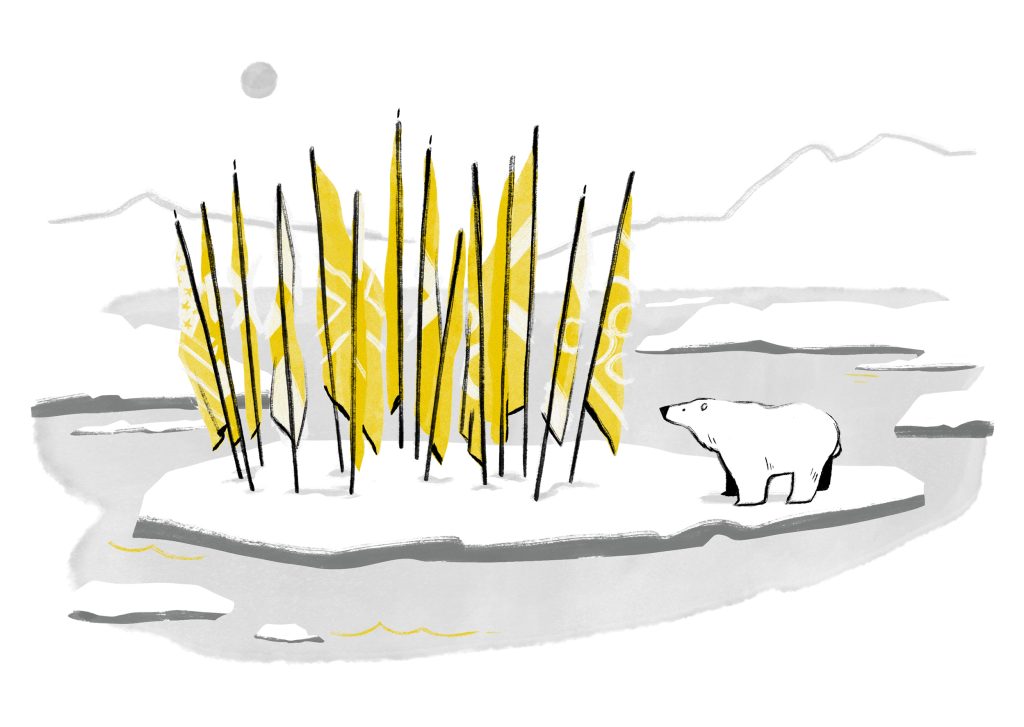Since its unprovoked invasion of Ukraine on 24 February, all countries in the Arctic region are opposing Russia. But even if isolated, Russia remains an important Arctic power and regional developments cannot be overlooked. In the same way that the world has an impact on the Arctic, the Arctic can have an impact on the world.
The consequences of the Russia-Ukraine war are not only seen in Europe, with over five million refugees fleeing and costlier heating bills, but also, in the international politics of the Arctic region. Exactly a week after the beginning of the aggression, the seven Arctic States (except Russia) of the Arctic Council – the region’s focal institution – published a Joint Statement declaring a boycott on future meetings as well as their decision of “temporarily pausing participation in all meetings of the Council and its subsidiary bodies.”
Over the years, cooperation in the Arctic region has addressed sustainable development, the protection of the environment, energy security, and respect for human rights. Above all, a significant part of the cooperation has been aimed at investigating climate change, a critical issue that demands collective action and accelerates the urgency of addressing other global challenges. The Arctic Council has been effective in fostering this cooperation by regularly producing comprehensive reports, as well as functioning as the top diplomatic forum for the region. Scientific cooperation also served Indigenous peoples and regional stakeholders, by facilitating the tracking and management of Arctic developments that could have spill-over effects in neighbouring areas. However, as of 3 March 2022, the Council has halted its operations indefinitely, and this leaves the prospect of cooperation in the north pole highly uncertain. An extended period without dialogue on Arctic matters can spill over in other policy areas, and the consequences may be far-reaching.
Not just an Arctic issue
Experts have for years framed the Arctic region as “exceptional,” marked only by functional cooperation and peaceful co-existence, insulated from all changes occurring outside the region. More recently, however, the exacerbation of climate change has brought more attention to the Arctic, states in and outside of the region are aware of the profit and opportunities an ice-free Arctic holds and have been developing strategic goals. In fact, the increasing number of Observer States to the Council, reveals that Arctic matters are now of interest to many.
China and the European Union are setting the tone for greater Arctic engagement in two ways. First, they emphasize the internationality of the Arctic – i.e., that the changing geographic setting concerns states worldwide – and second, they leverage their own established roles in global policymaking to engage with Arctic matters. For example, the EU promotes itself as a world leader in climate change mitigation, and thus, viewing climate change as a serious threat to the Arctic, asserts responsibility to help tackle the challenge in that region. Similarly, China, as a permanent member of the UN Security Council, champions peace and security also in the Arctic. These forces of change from non-Arctic states invalidate claims that Arctic politics is unaffected by global dynamics.
Arctic States had come together to establish the Council because they shared geographical traits and realized the sensitivity of the transnational challenges that were intrinsic to the region. If before the Arctic Council could act as a mediator of debates by promoting constructive dialogue, now Russia and the West could exploit the Ukrainian war to leverage action in the Council or with regards to Arctic matters. For example, adding to Russia’s threat of the use of nuclear weapons and dissatisfaction with NATO, Nikolai Korchunov (Russian Senior Arctic Official to the Council) warned about “unintended incidents” and security risks that recent NATO activities in the Arctic may bring.
In an Arctic without a functioning Arctic Council, grave security concerns could emerge. There are many triggers for confrontation and conflict in the Arctic – e.g., the abundance of rare earth minerals, and shipping and trade routes – and as of now it is deprived of an important channel of cooperation and communication.
It is the first time in the 25 years of its existence that the Council has reached this point. Even the Russian unilateral annexation of Crimea in 2014 left the Council relatively unbothered, and previous crises involving Western-minded states (e.g., Afghanistan and Syria among others) did not have ripple effects inside the Council. But the unprecedented actions declared in the Joint Statement prove that the Arctic and the Arctic Council do not truly exist in a vacuum and discredit the prevailing belief that the Arctic is an exception in international relations.
Russia’s position
Until May 2023 Russia holds the Chairmanship of the Arctic Council, a rotating role in which the designated state has more responsibilities, such as overseeing the agenda and prioritizing action. The Joint Statement isolates Russia, but it did not trigger a shocking reaction: Russia merely called it “regrettable” and announced that their efforts would now be redirected towards their “domestic needs in the region.” Indeed, Russia’s position in the Arctic is the largest given that more than half of the Arctic Ocean’s coastline lies within Russian borders. It is also the strongest Arctic military power, having built capacity and invested in modernizing bases and weapon systems since the late 2000s.
A rift between Russia and the West has existed in the north pole since long before the Ukraine war, given that Denmark, Finland, and Sweden are EU Members; Greenland (through Denmark), Iceland and Norway are in the European Economic Area; and Canada and the United States are NATO members. The temporary withdrawal of Western-minded states from the Council will further deepen this rift, as Sweden and Finland – Arctic States who are partners to NATO (and currently considering membership) – are now threatened by the actions of Russia in Ukraine. Their security is further compromised as Russia threatens “military and political consequences” if they were to join the alliance.
Russia is apparently alone in the Arctic, but it is currently holding the upper hand in a scenario of competition and confrontation, owing to its high militarization and ability to operate in such an extreme region. Further, in the hopeful prospect of returning to cooperation in the Arctic it is hard to imagine Western-minded powers excluding Russia, given its large geographical presence.
***
Today, the Arctic is left without an institution that until recently proved successful in fostering Russia-West dialogue. It remains to be seen how long the boycott will last and the far-reaching implications it will have for the inhabitants of the Arctic as well as for all States with stakes in the region. The Ukraine war has caused an abrupt halt in Arctic cooperation – what will it take to restore it?

Francesca is a 2023 Master of Public Policy candidate at the Hertie School and the Deputy Editor-in-Chief at The Governance Post. Italian, with various international experiences, she completed an International Relations BSc and Global Politics MSc. She is interested in international law and policy-making, as well as the geopolitics of the Arctic region. In her free time, she enjoys practicing sports, cooking, and exploring Berlin.
